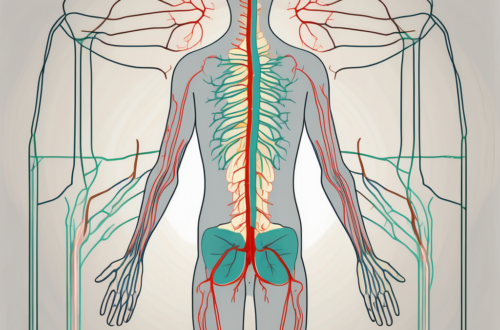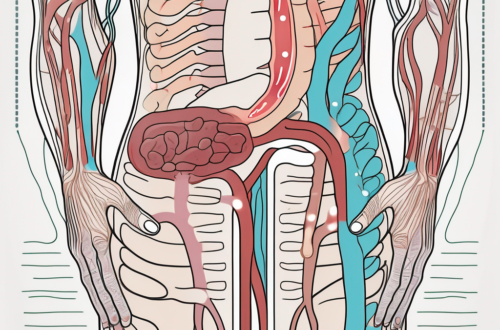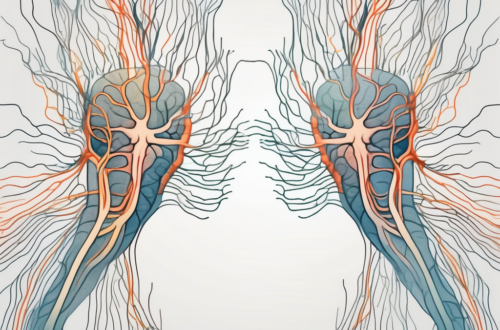The parasympathetic nervous system plays a crucial role in maintaining optimal health and well-being. It is responsible for promoting relaxation, controlling bodily functions, and restoring balance after periods of stress or intense activity. However, when the parasympathetic nerve weakens, it can lead to a range of symptoms and challenges that can significantly impact a person’s quality of life. In this comprehensive guide, we will explore the understanding, causes, diagnosis, treatment options, prevention strategies, and living with weak parasympathetic nerve. It is important to note that while this guide provides valuable insights and information, it is not intended to replace professional medical advice. If you are experiencing any of the symptoms mentioned here, we recommend consulting with a healthcare provider for a proper evaluation and personalized treatment options.
Understanding the Parasympathetic Nervous System
The parasympathetic nervous system is one of the two branches of the autonomic nervous system, along with the sympathetic nervous system. While the sympathetic nervous system prepares the body for “fight or flight” responses to stress, the parasympathetic nervous system counterbalances this by promoting relaxation, rest, and digestion. It is like the yin to the sympathetic’s yang, bringing the body back to a state of calm and equilibrium. Understanding the delicate interplay between these two systems is crucial to comprehending the impact of a weak parasympathetic nerve.
The Role of the Parasympathetic Nervous System
The parasympathetic nervous system regulates a variety of bodily functions, including heart rate, digestion, urination, and sexual arousal. It works by releasing neurotransmitters such as acetylcholine, which help to slow down heart rate, increase blood flow to the digestive system, and stimulate glandular secretions. These actions allow the body to conserve energy, facilitate rest and recovery, and promote overall well-being.
In addition to its role in heart rate regulation, the parasympathetic nervous system also plays a crucial role in digestion. When activated, it stimulates the production of digestive enzymes and increases blood flow to the gastrointestinal tract, promoting efficient digestion and nutrient absorption. This is why individuals with a weak parasympathetic nerve may experience poor digestion and related gastrointestinal issues.
Furthermore, the parasympathetic nervous system is involved in urinary function. It helps to relax the muscles of the bladder and promote urination when necessary. A weak parasympathetic nerve can lead to difficulties in urination and may contribute to urinary retention or incontinence.
Another important function of the parasympathetic nervous system is its role in sexual arousal. When activated, it increases blood flow to the genital area and promotes the release of sexual hormones. A weak parasympathetic nerve can result in a decrease in sexual arousal and may contribute to sexual dysfunction.
Symptoms of a Weak Parasympathetic Nerve
When the parasympathetic nerve weakens, it can manifest in various symptoms and health challenges. Some common signs of a weak parasympathetic nerve include:
- Difficulty relaxing and unwinding: Individuals with a weak parasympathetic nerve may find it challenging to switch off their minds and relax, leading to feelings of restlessness and tension.
- Poor digestion and related gastrointestinal issues: As mentioned earlier, a weak parasympathetic nerve can result in poor digestion, leading to symptoms such as bloating, gas, constipation, or diarrhea.
- Irregular heart rate or arrhythmia: The parasympathetic nervous system helps regulate heart rate. When it is weakened, individuals may experience irregular heartbeats or arrhythmias.
- Excessive sweating: Sweating is controlled by the autonomic nervous system, and a weak parasympathetic nerve can disrupt this balance, leading to excessive sweating even in non-stressful situations.
- Inability to focus and concentrate: The parasympathetic nervous system plays a role in promoting mental clarity and focus. A weak parasympathetic nerve can result in difficulty concentrating and maintaining attention.
- Insomnia or disrupted sleep patterns: The parasympathetic nervous system is responsible for promoting rest and relaxation. When it is compromised, individuals may experience difficulties falling asleep or staying asleep throughout the night.
It is important to note that these symptoms can also be associated with other underlying medical conditions. Therefore, it is crucial to undergo a thorough diagnosis by a healthcare professional to determine the exact cause and appropriate treatment.
Causes of Weak Parasympathetic Nerve
Several factors can contribute to the weakening of the parasympathetic nerve. While some causes are genetic or related to underlying medical conditions, others can be influenced by lifestyle choices and environmental factors.
Genetic Factors
Research suggests that some individuals may have a genetic predisposition to a weaker parasympathetic nerve. Genetic mutations or alterations in the genes responsible for the regulation of the parasympathetic nervous system can impact its functioning and lead to related symptoms.
For example, studies have shown that certain variations in the CHRM2 gene, which encodes a receptor involved in parasympathetic nerve signaling, can result in reduced parasympathetic activity. This genetic predisposition can make individuals more susceptible to experiencing symptoms such as digestive issues, decreased heart rate variability, and impaired relaxation response.
Furthermore, other genes involved in the development and maintenance of the parasympathetic nervous system, such as those encoding various neurotransmitters and their receptors, can also play a role in determining the strength of the parasympathetic nerve.
Lifestyle Factors
Lifestyle choices such as a sedentary lifestyle, poor diet, chronic stress, and inadequate sleep can all contribute to the weakening of the parasympathetic nerve. It is essential to adopt a healthy, balanced lifestyle that incorporates regular exercise, nutritious food choices, stress reduction techniques, and sufficient rest to support the optimal functioning of the parasympathetic nervous system.
Engaging in regular physical activity not only promotes cardiovascular health but also stimulates the parasympathetic nervous system. Activities such as yoga, tai chi, and deep breathing exercises can specifically activate the parasympathetic response, leading to relaxation and improved overall well-being.
Additionally, a diet rich in fruits, vegetables, whole grains, and lean proteins provides the necessary nutrients for the proper functioning of the parasympathetic nerve. On the other hand, a diet high in processed foods, saturated fats, and added sugars can contribute to inflammation and oxidative stress, negatively impacting the parasympathetic nervous system.
Chronic stress, whether from work, relationships, or other sources, can also weaken the parasympathetic nerve. Prolonged activation of the sympathetic nervous system, which is responsible for the body’s stress response, can disrupt the balance between the sympathetic and parasympathetic systems. This imbalance can lead to symptoms such as anxiety, insomnia, and digestive issues.
Furthermore, inadequate sleep can impair the functioning of the parasympathetic nerve. During sleep, the body undergoes essential repair and restoration processes, including the regulation of the autonomic nervous system. Lack of quality sleep can disrupt these processes, affecting the parasympathetic nerve’s ability to function optimally.
Medical Conditions
Underlying medical conditions, such as diabetes, autoimmune disorders, certain neurological conditions, or damage to the nerves, can also weaken the parasympathetic nerve. It is crucial to address and manage these conditions effectively to alleviate symptoms and prevent further damage.
Diabetes, for example, can lead to autonomic neuropathy, a condition characterized by damage to the nerves that control involuntary bodily functions, including the parasympathetic nervous system. This damage can result in impaired regulation of various organs and systems, leading to symptoms such as gastroparesis (delayed stomach emptying), urinary retention, and cardiovascular abnormalities.
Autoimmune disorders, such as Sjögren’s syndrome or autoimmune autonomic ganglionopathy, can also target the parasympathetic nerve, causing dysfunction and related symptoms. In these conditions, the immune system mistakenly attacks the body’s own tissues, including the nerves involved in parasympathetic regulation.
Furthermore, certain neurological conditions, such as Parkinson’s disease or multiple system atrophy, can affect the parasympathetic nerve due to degeneration or damage to specific brain regions or nerves. This impairment can lead to various autonomic symptoms, including orthostatic hypotension (low blood pressure upon standing), constipation, and urinary problems.
In cases where there is direct damage to the nerves, such as from trauma or surgery, the parasympathetic nerve can be weakened or disrupted. Nerve injuries can interrupt the transmission of signals between the brain, spinal cord, and target organs, resulting in impaired parasympathetic function.
Overall, understanding the causes of a weak parasympathetic nerve is essential for developing effective strategies to support its optimal functioning. By addressing genetic factors, adopting a healthy lifestyle, and managing underlying medical conditions, individuals can promote the strength and balance of their parasympathetic nervous system, leading to improved overall well-being.
Diagnosis of Weak Parasympathetic Nerve
Diagnosing a weak parasympathetic nerve involves a comprehensive evaluation of a person’s medical history, physical examination, and, in some cases, specialized tests and imaging studies.
When it comes to diagnosing a weak parasympathetic nerve, healthcare providers take a thorough approach. They begin by reviewing the individual’s medical history, paying close attention to any symptoms experienced, lifestyle choices, and potential underlying conditions. This step is crucial in understanding the context and possible causes of the weak parasympathetic nerve. By gathering this information, healthcare providers can start to form a more comprehensive picture of the individual’s health.
Following the medical history review, a physical examination is conducted. During this examination, healthcare providers assess vital signs, reflexes, and any other relevant findings. By doing so, they can identify any physical signs or symptoms that may be indicative of a weak parasympathetic nerve. This step allows healthcare providers to gather objective data and further narrow down the potential causes of the issue.
In certain cases, healthcare providers may order additional laboratory tests to rule out underlying medical conditions that could be contributing to the weak parasympathetic nerve. These tests may include blood work, which can provide valuable insights into the individual’s overall health and identify any abnormalities that may be affecting the parasympathetic nerve. By analyzing the results of these tests, healthcare providers can gain a more comprehensive understanding of the individual’s condition.
Furthermore, imaging studies such as MRI or CT scans may be recommended to evaluate the structures and functioning of the nervous system. These imaging techniques provide detailed visualizations of the nerves, allowing healthcare providers to identify any potential abnormalities or damage that may be affecting the parasympathetic nerve. By utilizing these advanced imaging technologies, healthcare providers can gain a deeper understanding of the individual’s condition and tailor their treatment approach accordingly.
Treatment Options for Weak Parasympathetic Nerve
The treatment for a weak parasympathetic nerve is aimed at addressing the underlying cause, managing symptoms, and promoting overall well-being. It is crucial to work closely with a healthcare professional to develop a personalized treatment plan.
A weak parasympathetic nerve can lead to a variety of symptoms, including irregular heart rhythms, digestive issues, and a general feeling of unease. To address these symptoms and improve the function of the parasympathetic nervous system, a combination of medications, supplements, physical therapy, exercises, and dietary changes may be recommended.
Medications and Supplements
In some cases, medications may be prescribed to manage specific symptoms associated with a weak parasympathetic nerve. For example, if arrhythmia is present, antiarrhythmic drugs may be prescribed to regulate heart rhythm. Similarly, gastrointestinal issues may be managed with medications that promote healthy digestion.
In addition to medications, supplements can also play a role in supporting the parasympathetic nervous system. B vitamins, such as B12 and B6, are known to support nerve health and function. Herbs like chamomile and lavender are known for their calming effects and can help promote relaxation.
However, it is essential to consult with a healthcare provider before starting any new medication or supplement regimen. They can assess your specific needs and recommend the most appropriate options for your situation.
Physical Therapy and Exercises
Physical therapy and specific exercises can be beneficial in strengthening and stimulating the parasympathetic nervous system. Breathing techniques, such as diaphragmatic breathing or alternate nostril breathing, can help activate the relaxation response and reduce stress levels.
Yoga and tai chi are also effective practices for promoting relaxation, improving blood circulation, reducing muscle tension, and supporting overall well-being. These activities combine gentle movements with deep breathing, creating a harmonious balance between body and mind.
Engaging in regular physical activity, such as walking or swimming, can also have a positive impact on the parasympathetic nervous system. Exercise helps release endorphins, which are natural mood boosters, and promotes a sense of well-being.
Dietary Changes and Nutrition
A well-balanced diet rich in nutrients, antioxidants, and healthy fats can support the optimal functioning of the parasympathetic nervous system. Including foods such as leafy greens, whole grains, lean proteins, and omega-3 fatty acids can provide the necessary nourishment for optimal nerve health.
Leafy greens, such as spinach and kale, are packed with vitamins and minerals that support nerve function. Whole grains, like quinoa and brown rice, provide a steady release of energy and help maintain stable blood sugar levels.
Lean proteins, such as chicken, fish, and tofu, are important for muscle growth and repair. Omega-3 fatty acids, found in fatty fish like salmon and sardines, have anti-inflammatory properties and can help reduce stress on the parasympathetic system.
Additionally, reducing the intake of caffeine, processed foods, and refined sugars can minimize stress on the parasympathetic system. These substances can overstimulate the sympathetic nervous system, which is responsible for the body’s fight-or-flight response.
It is important to note that dietary changes should be made gradually and in consultation with a healthcare professional or registered dietitian to ensure they align with individual needs and health conditions.
By combining medications, supplements, physical therapy, exercises, and dietary changes, individuals with a weak parasympathetic nerve can improve their symptoms and overall well-being. It is essential to work closely with a healthcare professional to develop a comprehensive treatment plan that addresses the specific needs of each individual.
Prevention Strategies for Weak Parasympathetic Nerve
Prevention is always better than cure when it comes to maintaining the health and integrity of the parasympathetic nerve. By adopting certain lifestyle strategies, individuals can promote the optimal functioning of their parasympathetic nervous system.
Regular Exercise and Healthy Lifestyle
Engaging in regular exercise, such as cardiovascular activities, strength training, or mind-body practices, can enhance the overall functioning of the parasympathetic nervous system. Additionally, maintaining a healthy lifestyle that prioritizes nutritious food choices, adequate sleep, stress reduction techniques, and avoiding harmful substances can play a crucial role in preventing a weakened parasympathetic nerve.
Stress Management Techniques
Chronic stress can significantly impact the parasympathetic nervous system. Employing stress management techniques such as mindfulness meditation, deep breathing exercises, journaling, or engaging in hobbies and activities that bring joy and relaxation can help manage stress levels and support optimal parasympathetic functioning.
Regular Medical Check-ups
Regular medical check-ups are essential for early detection and management of any underlying medical conditions that can weaken the parasympathetic nerve. Consultations with healthcare professionals can help identify potential risk factors, provide appropriate guidance, and ensure the overall well-being of the nervous system.
Living with a Weak Parasympathetic Nerve
Coping with a weak parasympathetic nerve requires a multifaceted approach that addresses both physical and emotional well-being. It is essential to develop coping mechanisms, seek support, and take necessary steps to manage symptoms effectively.
Coping Mechanisms and Support
Developing coping mechanisms, such as stress reduction techniques, relaxation exercises, and emotional support, can significantly improve the quality of life for individuals with a weak parasympathetic nerve. Engaging in activities that promote relaxation, practicing self-care, and seeking support from loved ones or support groups can provide a sense of comfort and understanding.
Long-term Management and Care
Living with a weak parasympathetic nerve may require ongoing management and care. Regular consultations with healthcare professionals, adherence to prescribed treatment plans, and lifestyle modifications can help minimize symptoms and improve overall well-being. It is vital to communicate openly with healthcare providers, ask questions, and seek clarification to ensure the best possible care and management of the condition.
Future Research and Developments
The field of neuroscience is constantly evolving, with ongoing research and advancements in the understanding and treatment of various nervous system disorders. Future research holds the promise of further insights into the management and potential cure for weak parasympathetic nerves. Staying updated and informed about the latest developments can provide individuals with hope and optimism for the future.
To conclude, understanding how to cure a weak parasympathetic nerve involves a comprehensive approach that encompasses the understanding of its role, causes, diagnosis, treatment options, prevention strategies, and living with the condition. By seeking professional medical advice, making lifestyle modifications, and taking proactive steps to support the parasympathetic nervous system, individuals can improve their well-being and minimize the challenges associated with a weak parasympathetic nerve.





